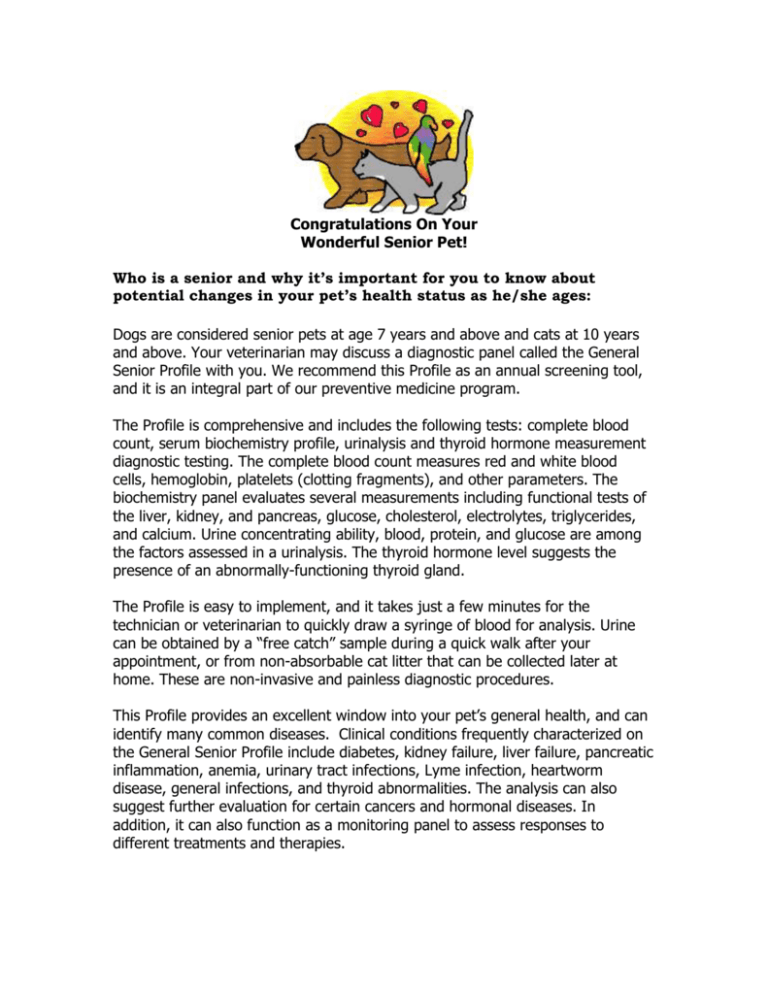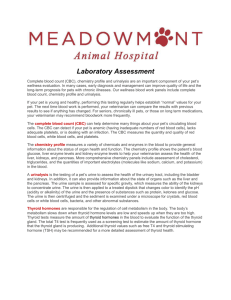Your veterinarian may discuss a diagnostic panel called “senior
advertisement

Congratulations On Your Wonderful Senior Pet! Who is a senior and why it’s important for you to know about potential changes in your pet’s health status as he/she ages: Dogs are considered senior pets at age 7 years and above and cats at 10 years and above. Your veterinarian may discuss a diagnostic panel called the General Senior Profile with you. We recommend this Profile as an annual screening tool, and it is an integral part of our preventive medicine program. The Profile is comprehensive and includes the following tests: complete blood count, serum biochemistry profile, urinalysis and thyroid hormone measurement diagnostic testing. The complete blood count measures red and white blood cells, hemoglobin, platelets (clotting fragments), and other parameters. The biochemistry panel evaluates several measurements including functional tests of the liver, kidney, and pancreas, glucose, cholesterol, electrolytes, triglycerides, and calcium. Urine concentrating ability, blood, protein, and glucose are among the factors assessed in a urinalysis. The thyroid hormone level suggests the presence of an abnormally-functioning thyroid gland. The Profile is easy to implement, and it takes just a few minutes for the technician or veterinarian to quickly draw a syringe of blood for analysis. Urine can be obtained by a “free catch” sample during a quick walk after your appointment, or from non-absorbable cat litter that can be collected later at home. These are non-invasive and painless diagnostic procedures. This Profile provides an excellent window into your pet’s general health, and can identify many common diseases. Clinical conditions frequently characterized on the General Senior Profile include diabetes, kidney failure, liver failure, pancreatic inflammation, anemia, urinary tract infections, Lyme infection, heartworm disease, general infections, and thyroid abnormalities. The analysis can also suggest further evaluation for certain cancers and hormonal diseases. In addition, it can also function as a monitoring panel to assess responses to different treatments and therapies. The Profile frequently identifies clinical conditions in asymptomatic (no symptoms) patients presenting for wellness exams. Many cases are identified in our hospital setting and three cases are worth mentioning as they identified problems before the patients became ill and illustrate the value of a senior wellness screening. We hope you appreciate the importance of early detection to your pet’s overall health once you read these actual cases from some of our own patients. We also hope you will understand why your pet’s veterinarian may recommend that you perform this screening during your pet’s visit to the clinic. If your pet’s blood work comes out normal, then you will have peace of mind that your pet doesn’t have any undetected illness and your pet’s doctor will have a baseline history of your pet’s profile. “Casey” is a senior dog who presented for a wellness examination and vaccines with no clinical problems. The General Senior Profile was completely normal except for the presence of low platelets. “Casey” subsequently underwent diagnostic testing, including a bone-marrow biopsy. She was diagnosed with immune-mediated thrombocytopenia, underwent treatment, and is doing very well at this writing. “Casey” never became ill, thanks to the early screening by the Profile. “Zoe” is a senior dog who presented for a wellness exam without clinical illness. Her panel identified an elevated calcium value. Elevated calcium, or hypercalcemia, can be suggestive of certain cancers and hormonal diseases, and if untreated can hurt the kidneys. “Zoe” underwent further testing and was diagnosed with a parathyroid (a gland in the neck) tumor. She had surgery for parathyroid tumor removal, and is healthy at this writing. "Bailey" is a 12-year-old Labrador Retriever who presented to the clinic for an annual wellness exam and vaccinations. Routine senior wellness blood work was analyzed, and anemia (decreased red blood cell count) was discovered. Further diagnostics, including an ultrasound, revealed a tumor on the spleen. Surgery was performed to remove the tumor; biopsy analysis revealed the presence of hemangiosarcoma, a vessel tumor which can cause intra-abdominal bleeding, fainting, collapse, and sudden death. Early detection was facilitated through the routine blood work and allowed for early intervention and prevention of severe illness.











